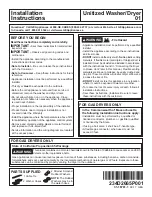
EN
3
Electrical connection
Before inserting the plug into the electrical socket, make sure
that:
• The socket is earthed and complies with current regulations.
• The socket can withstand the maximum load of the appliance,
which is indicated on the data plate located on the inside of the
door (
see chapter entitled Description of the appliance
).
• The power supply voltage falls within the values indicated on
the data plate on the inside of the door.
• The socket is compatible with the plug of the appliance. If this
is not the case, ask an authorised technician to replace the
plug (
see Assistance
); do not use extension cables or multiple
sockets.
Once the appliance has been installed, the power supply
cable and the electrical socket should be easily accessible.
The cable should not be bent or compressed.
If the power supply cable is damaged, it must be replaced
by the manufacturer or its Technical Assistance Service in order to
prevent all potential hazards. (See Assistance)
The Company shall not be held responsible for any incidents
that occur if these regulations are not observed.
Anti-condensation strip
*
After installing the dishwasher, open the door and stick the
adhesive transparent strip under the wooden shelf in order to
protect it from any condensation which may form.
Advice regarding the first wash cycle
After the appliance has been installed, immediately before running
the first wash cycle, completely fill the salt dispenser with water
and add only then approximately 1 kg of salt (
see chapter entitled
Rinse aid and refined salt
). The water may overflow: this is normal
and is not a cause for concern. Select the water hardness value
(
see chapter entitled Rinse aid and refined salt
).
-
After the salt
has been poured into the machine, the LOW SALT indicator
light
*
switches off.
If the salt container is not filled, the water softener and the
heating element may be damaged as a result.
Technical data
Dimensions
width 60 cm
height 85 cm
depth 60 cm
Capacity
14 standard place-settings
Water supply
pressure
0,05 ÷ 1MPa (0.5 ÷ 10 bar)
7,25 – 145 psi
Power supply
voltage
See appliance data plate
Total absorbed
power
See appliance data plate
Fuse
See appliance data plate
This dishwasher conforms to the
following European Community
Directives:
-2006/95/EC (Low Voltage)
-2004/108/EC (Electromagnetic
Compatibility)
-2005/32/EC (Comm. Reg.
1275/2008) (Ecodesign)
-97/17/EC (Labelling)
-2002/96/EC
Waste Electrical
and Electronic Equipment
(WEEE)
ECODESIGN REGULATION
ECO wash cycle is the standard cycle to which the energy label data refers; this cycle can be used to wash crockery with a normal
soil level and is the most efficient in terms of energy and water consumption for this type of crockery. To reduce consumption even
further, only run the dishwasher when it is full.
Standby consumption: Left-on mode consumption: 4,5 W – Off mode consumption: 1,3 W
Consumption data table for the main cycles
*
Cycle data refers to the values recorded in a laboratory, in accordance with European standard EN 50242.
**
Data is obtained by recording values when the appliance is operational and loaded with user crockery.
Standard conditions
*
User
conditions
**
Energy consumption
(kWh/cycle)
Water consumption
(l/cycle)
Duration
(min/cycle)
Energy consumption
(kWh/cycle)
Water consumption
(l/cycle)
Duration
(min/cycle)
INTENSIVE
1,50 15 150
1,30 14 135
NORMAL
1,20 15 120
1,05 14 110




































